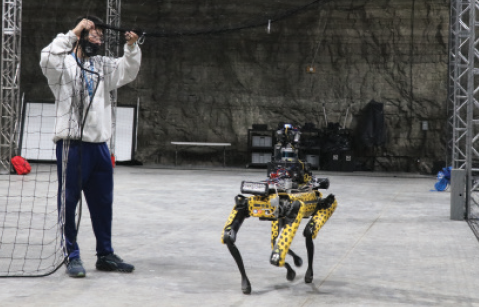From The Link: Lessons Learned From the SubT Challenge
Aaron AupperleeTuesday, May 17, 2022Print this page.

As the countdown started, a boxy robot with four big wheels carrying a host of cameras, sensors, communication equipment, autonomy software and the computing power to make it all work together rolled down a ramp into a dark tunnel.
It did not know where it was, what was ahead of it or where it was going. It was there to explore.
Over the next hour, more robots followed: wheeled robots, drones and a dog-like quadruped.
Team Explorer deployed eight robots for the final round of the Defense Advanced Research Projects Agency (DARPA) Subterranean, or SubT, Challenge — a three-year competition during which teams from around the world raced to develop robotic systems that could autonomously operate in underground environments like caves, mines or subway stations for search and rescue missions.
The team took fourth in the final competition, missing out on hundreds of thousands of dollars in prize money by only a few points.
Over the course of the challenge, a team of students, faculty and staff from Carnegie Mellon University and Oregon State University created robots and drones tough enough to bang into walls; roll and walk over ruts, rails and rocks; and find their way through dark, unknown and treacherous terrain. The robots worked in unison, telling each other where they had explored, pointing out areas of the course for others to explore, and passing along information about what they had found to each other and the team.
"I think back to three years ago and what we were thinking about was essentially science fiction then," said Sebastian Scherer, an assistant professor in the Robotics Institute and a co-lead of Team Explorer. "Teams of drones zipping around and ground robots just going out exploring, it was just not a thing. And now, we’d feel very comfortable sending a drone into some random environment and thinking it will have a really high chance of coming back."
Read more about Team Explorer, the SubT Challenge and what the team learned from the competition in our magazine, The Link.
Aaron Aupperlee | 412-268-9068 | aaupperlee@cmu.edu
